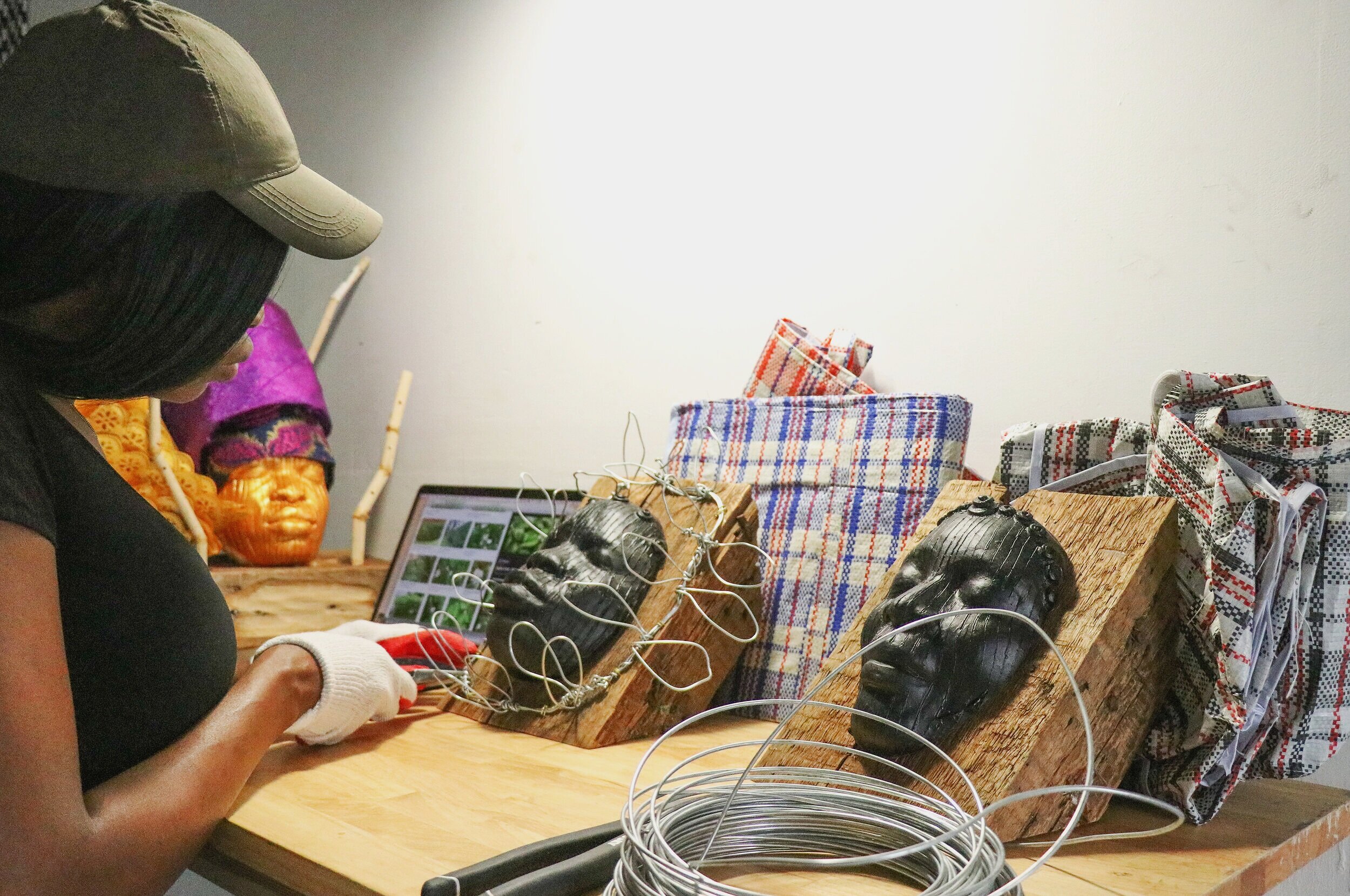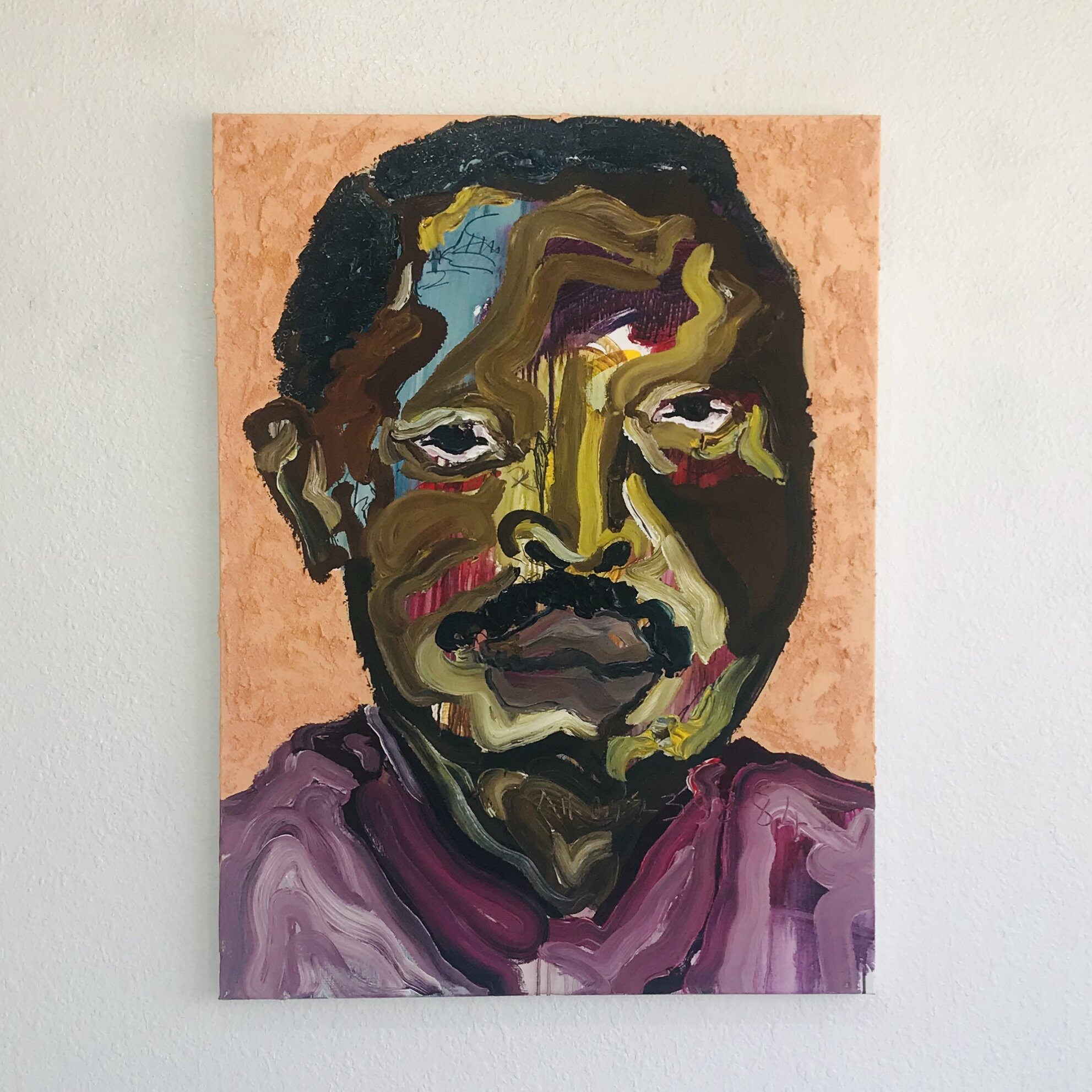That’s Six Bro Pt. III, courtesy of the artist
Storm Ascher: Where are you currently? Did you have to relocate your studio during the shutdown?
Courtesy of Marcus Leslie Singleton studio
Marcus Leslie Singleton: I’m in Brooklyn, and nah, I’m still painting here in Brooklyn.
Storm Ascher: What is it like to be an art teacher during these times? Are you in contact with your students?
Marcus Leslie Singleton: We’ve been doing this remote teaching thing. I don’t like it, I think for all of us, we’d rather be in the school together. But we have been using Zoom, there are so many possibilities so we have had to get creative in how to approach our curriculums and attendance etc. But this was my last year teaching.
Storm Ascher: Can you elaborate on your experiences on these recent accomplishments of yours: SPRING/BREAK booth in NY and your show with Superposition in LA for FRIEZE
Marcus Leslie Singleton: Being in both Frieze LA & Spring/Break NYC were great experiences, I really love to see what everyone is making and visiting different galleries all in the same place. It was great.
Storm Ascher: Placement in the residency that decorates their hotel with your artwork?
Marcus Leslie Singleton: The hotel is named Sincerely Tommy Eat & Stay. It’s ran by a close friend of mine, Kai Avent de-Leon. All of these opportunities came around the same time. It’s wild how that happens. Before I was spending lots of time in the studio just creating. And then opportunities start funneling in, now I have a lot of work outside of the studio being seen by more eyes. It’s a new thing, it feels good to share your ideas and beauty with the world.All of these opportunities came around the same time. It’s wild how that happens. Before I was spending lots of time in the studio just creating. And then opportunities start funneling in, now I have a lot of work outside of the studio being seen by more eyes. It’s a new thing, it feels good to share your ideas and beauty with the world.
Storm Ascher: Do you think your artwork is received differently depending on its exhibition location? ex. LA vs Seattle vs New York.
Protestors On Eastern Pkwy, 2020, courtesy of the artist
Marcus: The art scene in all these places differ. I love how vibrant the LA community is, lots of new ideas and concepts for what galleries look like and how they operate. New York has been the pinnacle of the art world for a number of decades but I think that’s changing. Also, you have the reflection of personalities, I’d never live in LA although I do love that city, I like the grind and grittiness of NYC. You just have different personalities and attitudes on each coast.
Storm: Have you exhibited in your home town?
Marcus: I had a couple of group shows, this was early, when I was first starting out in Seattle. I had a lot of work but I wasn’t showing much of anything, not selling anything. When I came to NY I started to gain momentum, people started expressing interest in my work.
Storm: You render paintings very similarly whether using watercolor, acrylic, or oil. Can you talk about that process, and how you decide which medium for each subject?
Marcus: I think of each paint medium as a language to communicate an idea through. Watercolor is in its essence fluid, which creates a soothing flow to the paint being applied. I love the versatility of acrylic. But oil is by far my favorite to use, the smell, texture and vibrancy of the color that good oil paint provides is unique. They are all different languages being spoken from the same tongue.
Storm: What is the story behind “No Home Here, 2017” that we showed at Labor of Love, where are the figures running from, or towards? I especially am curious because of their outfits as if they’ve dressed up for a night on the town, but the title is ominous.
No Home Here, 2017 featured in Labor of Love, Superposition Gallery
Marcus: It’s about this country. Is this our home? Doesn’t feel like home to me. We built this country, we got style, we are music. But we were here before the slave ships, this painting is talking about slavery’s affect on us.
Storm: I’ve noticed you’re using a lot of lighter hues in your recent paintings, why?
Marcus: Gotta brighten up this dark ass time a bit. I was running out of paint so to change this a bit I went mixing white paint into my colors.
Storm: Do you consider yourself prolific?
Marcus: Nah, not in a capitalistic sense. Not at all, I take my time in every aspect of my life.
Storm: What’s the most recent piece of criticism you received that changed your practice?
Marcus: This might sound egotistical but I don’t listen when it comes to criticism of my art. I’ve always created from my heart. I put all my energy into it. It exhausts me, but I love it. It’s a matter of endurance.
Storm: What books are you reading right now?
Marcus: I’m reading Futures of Black Radicalism by Gaye Theresa Johnson and A Philosophy of Loneliness by Lars Svendsen.
Storm: What does “Nomad” mean to you?
Marcus: Nomad to me means mobility, to simply say it.


















